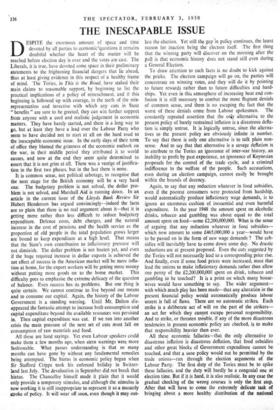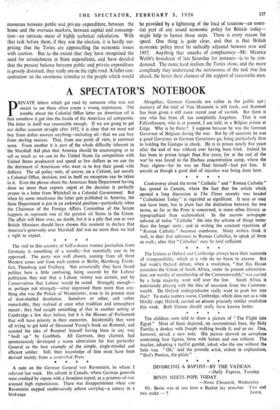THE INESCAPABLE ISSUE
DESPITE the enormous amount of space and time devoted by all parties to economiequestions it remains doubtful whether the heart of the matter . will be reached before election day is over and the votes are cast. The Liberals, it is true, have devoted some space in their preliminary statements to the frightening financial dangers that lie ahead, thus at least giving evidence in this respect of a healthy frame of mind. The Tories, in This is the Road, have staked their main claims to reasonable support, by beginning to list the practical implications of a policy of retrenchment, and if this beginning is followed up with courage,, in the teeth of the mis- representation and invective with which any cuts in State " benefits " are sure to be greeted, they can win further support from anyone with a cool and realistic judgement in economic matters. They have barely started, and there is a long way to go, but at least they have a lead over the Labour Party who seem to have decided not to start at all on the hard road to the inescapable economic issue. In the early days of their term of office they blamed the grimness of the economic outlook on the war, in their middle period they attributed it to world causes, and now at the end they seem quite determined to assert that it is not grim at all. There was a vestige of justifica- tion in the first two phases, but in the last there is none.
It is common sense, not political sabotage, to recognise that the next stage for the British economy will be a very hard one. The budgetary problem is not solved, the dollar pro- blem is not solved, and Marshall Aid is running down. In an article in the current issue of the Lloyds Bank Review Sir Hubert Henderson has argued convincingly—indeed the facts are so plain that there is no real argument about it—that it is getting more rather than less difficult to reduce budgetary expenditure. Defence costs, debt charges, and the natural increase in the cost of pensions and the health service as the proportion of old people in the total population grows larger are bound to keep expenditure at a high level. That means that the State's own contribution to inflationary pressure will not diminish. The dollar problem is not beaten yet, and even if the huge required increase in dollar exports is achieved the net effect of success in the American market will be more infla- tion at home, for the export workers will be getting more money without putting more goods on to the home market. This difficulty goes to emphasise the extreme delicacy of the question of balance. Even success has its problems. But one thing is quite certain. We cannot continue to live beyond our means and to consume our capital. Again, the history of the Labour Government is a standing warning. Until Mr. Dalton dis- appeared the fantastic attempt to increase both consumption and capital expenditure beyond the available resources was persisted in. Then capital expenditure was cut. If we run into another crisis the main pressure of the next set of cuts must fall on consumption of raw materials and food.
All these are hard sayings. Yet even Labour speakers could make them a few months ago, when stern warnings were more fashionable. What passes understanding is that so many months can have gone by without any fundamental remedies being attempted. The hiatus in economic policy began when Sir Stafford Cripps took his enforced holiday in Switzer- land last July. The devaluation in September did not break that hiatus. The Chancellor himself made it plain that it would only provide a temporary stimulus, and although the stimulus is now working it is still inappropriate to represent it as a masterly stroke of policy. It will wear off soon, even though it may out- last the election. Yet still the gap sin policy continues, the latest reason for inaction being the election itself. The first thing that the winning party will discover on the morning after the poll is that economic history does not stand still even during a General Election. '
To draw attention to such facts is no doubt to kick against the pricks. The election campaign will go on, the parties will concentrate on winning votes, and they will do it by pointing to future rewards rather than to future difficulties and hard- ships. Yet even in this atmosphere of increasing heat and con- fusion it is still necessary to combat the more flagrant denials of common sense, and there is no escaping the fact that the worst of these denials come from Labour spokesmen. The constantly repeated assertion that the only alternative to the present policy of barely restrained inflation is a disastrous defla- tion is simply untrue. It is logically untrue, since the alterna- tives to the present policy are obviously infinite in number. To say that there is only one alternative is to talk plaM non- sense; And to say that that alternative is a savage deflation is to attribute to the Tories an ignorance of inter-war history, an inability to profit by past experience, an ignorance of Keynesian proposals for the control of the trade cycle, and a criminal indifference to the welfare of the people. Such accusations, even during an election campaign, cannot easily be brought within the bounds of decency.
Again, to say that any reduction whatever in food subsidies, even if the poorest consumers were protected from hardship, would automatically produce inflationary wage demands, is to ignore an enormous cushion of inessential and even harmful expenditure. In the year 1948 the amount spent on alcoholic drinks, tobacco and gambling was about equal to the total amount spent on food—some £2,200,000,000. What is the sense of arguing that any reduction whatever in food subsidies— which now amount to some £465,000,000 a year—would have to be passed on in the form of new wage demands ? The sub- sidies will inevitably have to come down some day. No drastic reductions are at present proposed. Even the cuts suggested by the Tories will not necessarily lead to a corresponding price rise. And finally, even if some food prices were increased, must that lead the unions to make inflationary demands rather than allow one penny of the £2,200,000,000 spent on drink, tobacco and gambling to be touched? It is a point on which many house- wives would have something to say. The wider argument— with which much play has been made—that any alteration in the present financial policy would automatically produce labour unrest is full of flaws. There are no automatic strikes. Each strike is a deliberate act of will on the part of the strikers— an act for which they cannot escape personal responsibility. And td strike, or threaten -trouble, if any of the more disastrous tendencies in present economic policy are checked, is to make that responsibility heavier than ever.
All these economic fallacies—that the only alternative to disastrous inflation is disastrous deflation, that food subsidies and other great blocks of Government expenditure cannot be touched, and that a sane policy would not be permitted by the trade unions—run through the election arguments of the Labour Party. The first _duty of the Tories must be to spike these fallacies, and the duty will hardly be a congenial one at election time. But if it is hard, it is also realistic. In any case the gradual checking of the wrong courses is only the first step. After that will have to come the extremely delicate task of bringing about a more healthy distribution of the national resources between public and private expenditure, between the home and the overseas markets, between capital and consump- tion—an intricate maze of highly technical calculation. With that task before them, if they win the election, it is hardly sur- prising that the Tories are approacffing the economic issues with caution. But to the extent that they have recognised the need for retrenchment in State expenditure, and have decided that the present balance between public and private expenditure is grossly distorted, they really are on the right road. A fuller con- centration on the enormous stimulus to the people which would be provided by a lightening of the load of taxation—an essen- tial part of any sound economic policy for Britain today— might help to hasten those steps. There is every reason for speed. One thing is quite clear, and that is that British economic policy must be radically adjusted between now and 1952. Anything that smacks of complacency—Mr. Maurice Webb's broadcast of last Saturday for instance—is to be con- demned. The more hard realism the Tories show, and the more completely they understand the seriousness of the task that lies ahead, the better their chances of the support of reasonable men.



































 Previous page
Previous page